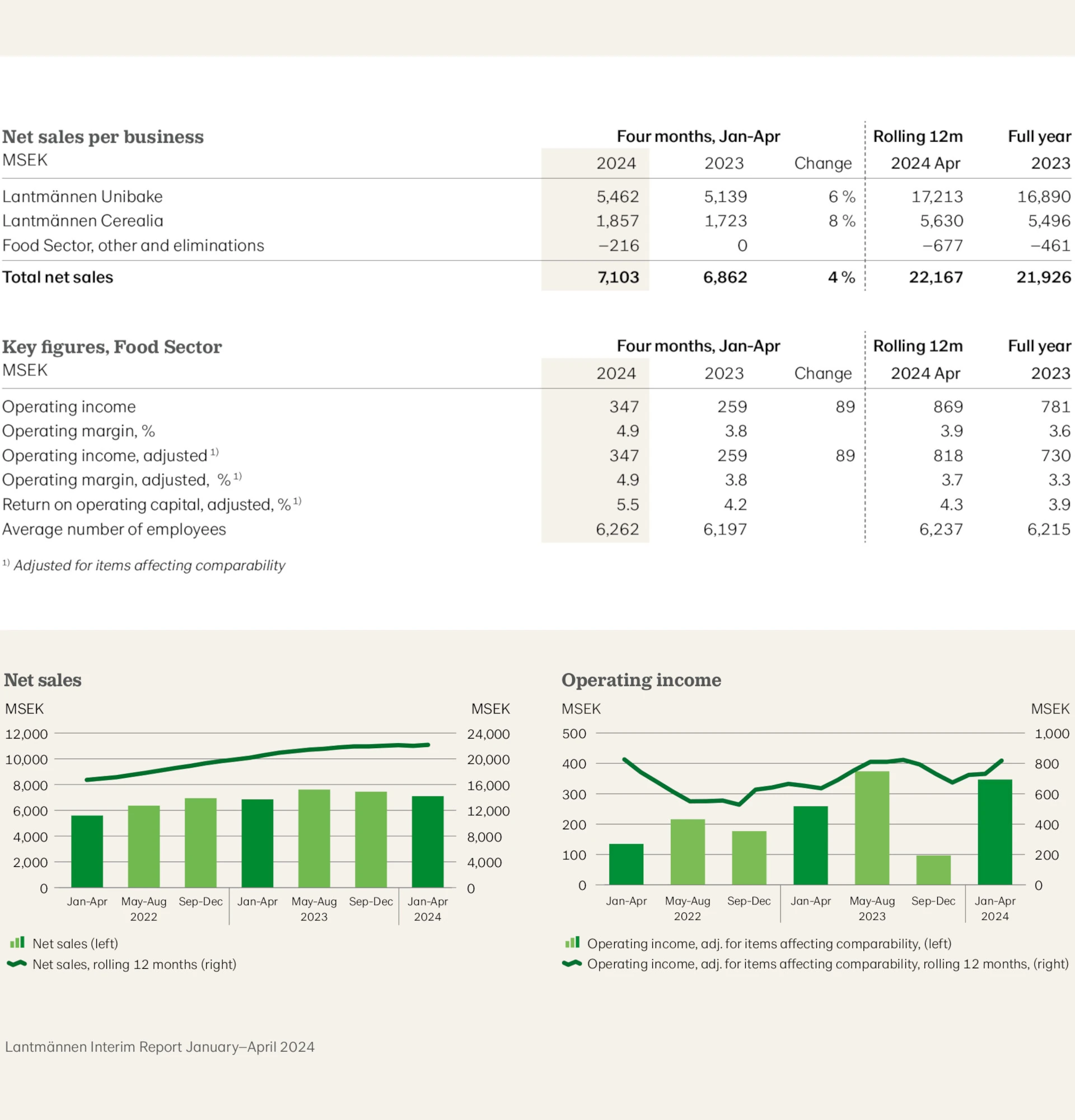Stockholm / SE. (lg) The result of Sweden’s Lantmännen Group after net financial items for the first four months of 2024 amounted to 708 MSEK, lower than last year’s record result of 826 MSEK for the same period – but on a historically high level.
«Lantmännen delivered a strong result for the year’s first four-month period, despite negative impact from last year’s poor harvest in the Agriculture Sector and from a lower ethanol price in the Energy Sector. Sales in the Food Sector have continued to recover, and the Swecon Business Area delivered a continued strong result. During the period, the acquisition of Scan was also completed, and I look forward to continuing the work with strengthening and developing that operation along with our other businesses,» says Group President and CEO Magnus Kagevik.
The figures below refer to operating profit. The previous year’s result in parentheses.
Agriculture: The Agriculture Sector’s result amounted to 28 MSEK (138). The result has been negatively impacted by effects from last year’s weak harvest. The result in the Finnish agricultural operations decreased slightly compared to the previous year.
Energy: The Energy Sector showed a result of 160 MSEK (333). The ethanol price has stabilized on a historically more normal level compared to previous very high levels, which has had an adverse impact on the result in Lantmännen Biorefineries. Lantmännen Aspen continued to develop positively, and Scandbio delivered a continued strong result for the four-month period.
Food Sector: The Food Sector’s result amounted to 347 MSEK (259), driven by the international businesses in Lantmännen Unibake. The improved result was mostly due to increased sales of frozen bread. The result in Lantmännen Cerealia stabilized during the four-month period.
- Unibake and Cerealia in 1. Tertial 2024: The Food Sector’s net sales increased, mainly due to higher sales volumes. Operating income amounted to MSEK 347 (259), driven by Lantmännen Unibake’s international businesses. The higher earnings for Unibake were largely due to increased frozen bread sales. Fresh bread sales also increa- sed but at a lower rate. Earnings were also positively affec- ted by focused work on cost control and continuous improvements in production. Investment in Unibake’s production facility in Romania con- tinues and production on the first line started early in the year. Lantmännen Cerealia’s earnings stabilized in the first four-month period. Sales volumes to consumers through food retail stores and in food service increased slightly, while demand in the B2B market was weaker. An agreement to divest the ready-to-eat food business under the Gooh brand to Atria Sweden was signed in Febru- ary. The transaction was completed in early May.
 (Table Food Sector: Lantmännen Group)
(Table Food Sector: Lantmännen Group)Swecon: The Swecon Business Area delivered a continued strong result: 247 MSEK (256). Demand for heavier machinery increased during the four-month period, while order intake for compact machines was weaker. Future prospects in the market remain uncertain – not least in Germany and the Baltic countries.
Real Estate: The Real Estate Business Area’s result amounted to 130 MSEK (79). The higher result was primarily generated in the leasing and project operations, which both continued to develop positively.
This year’s spring farming has begun in the entire country. Fall crops in Sweden have so far developed well, while the cold and wet spring has led to delayed spring farming for spring crops. Last year’s harvest was among the worst in 30 years, and Sweden – that usually exports grain – has instead had to import to cover its needs.
«Lantmännen continues to invest in the Swedish grain infrastructure. During the four-month period, we have inaugurated a new boat loader in our export port outside Norrköping, and ground has been broken for a new grain facility in Uddevalla. We are now approaching a harvest that is the most important in a long time. A good harvest this year is important both for our members and Swedish agriculture, but also for domestic food production and Swedish food security,» says Magnus Kagevik.
OTHER TOPICS FROM THIS SECTION FOR YOU:
- LG Chem and ADM: Joint Ventures in Illinois are canceled
- Wendy’s: Company plans to expand into Europe
- Delivery Hero: may face significant fine due to antitrust violations
- Emmi Group: intends to acquire Mademoiselle Desserts
- AB Foods: announces strong H1-2024 performance
- DSM-Firmenich: Queen Maxima inaugurates new dual head office
- RBI: Announces Investments to Drive Growth in China
- Europastry S.A.: puts its IPO process on hold
- McCormick: Reports Second Quarter Performance
- Reborn Coffee: Closes Master License Agreement for UAE
- General Mills: Reports Fiscal 2024 Fourth-Quarter Results
- SunOpta expands plant for processing plant-based beverages
- Britannia: Operating profit grew 10 percent in FY-2023
- Tate + Lyle and CP Kelco to merge to leading global player
- Ülker Bisküvi: announces Q1-2024 financial results
- Europastry: intends to go public on the Spanish stock exchange
- Europastry S.A.: publishes 2023 Annual Report
- Swisslog: announces new Americas region headquarters
- Reborn Coffee: Expanding Omni-Channel Strategy
- Mondelez International and Lotus Bakeries Join Forces



